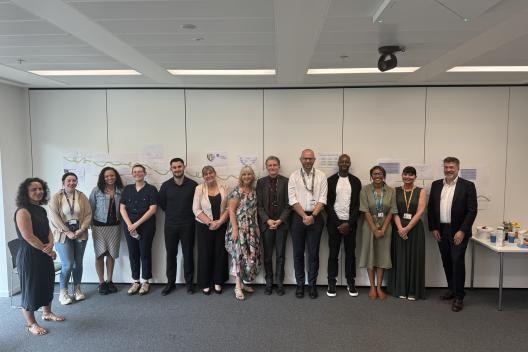Care-experienced young adults (18-25 years old) are overrepresented in the prison system; approximately 25% of all adult prisoners have had experience of care, compared to 1% of the general population.
Since 2017, Innovation Unit has been shining a spotlight on the additional challenges facing care-experienced young adults given prison sentences, and testing what could help them to thrive following release.
The result is the Always Hope offer, co-designed and piloted with a committed and passionate group of national and local statutory and voluntary sector partners in the West Midlands, including care-experienced young adults serving prison sentences at the time.
The model is focussed on offering integrated and sustainable support for young adults, both from the professionals working with them and their personal support networks.
"[Always Hope] shows the young person that there are people who care about them."Practitioner at Coventry City Council
The impact
The independent evaluation of Always Hope (available below) found that Always Hope had:
- increased awareness and understanding of the needs and circumstances of care-experienced young people in prison, particularly among prison professionals, and enhanced their commitment to working with them
- improved joint working between professionals in leaving care services and the prison and probation service in terms of better planning, increased accountability, and understanding of each other’s roles
"Coming together as a team to support this young man as he prepares for his release has given us all a much better chance to support him with what he needs, as we can keep him and each other up to date on his progress. "Probation Officer
The approach
The Always Hope model was initially developed by generating insights and carrying out mixed-methods research; we identified that the fragmentation of care was a real barrier to leaving prison ‘well’.
In the next phase we mobilised energy for the project, gaining commitment from practitioners and senior leaders at a national level, and co-designed a new approach that brought together local authorities, prison, probation and VCSE services.
The new approach had two strands:
- Creating an integrated plan for each young adult by aligning statutory assessment and planning between practitioners in the prison, probation and leaving care services.
- Developing a sustainable and coordinated support network for care leavers, both for when they’re in prison and when they’re released, using Family Rights Group’s Lifelong Links approach.
We piloted this approach over 18 months, working closely with Birmingham, Coventry and Wolverhampton, leaving care and probation services, and HMPS Brinsford and Swinten Hall, to support a cohort of 61 young adults.
Next steps
The Always Hope approach is being scaled using the handbook and implementation guidance below.
We are now working with HMP Foston Hall to co-design a bespoke gender sensitive offer for women with experience of care serving prison sentences, whilst also working with central government to embed the Always Hope model more deeply, both locally and nationally.
Resources
The Always Hope approach has been piloted, evaluated, and is being scaled
Share this page









